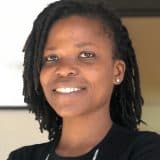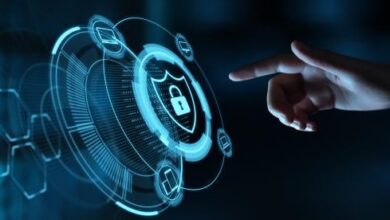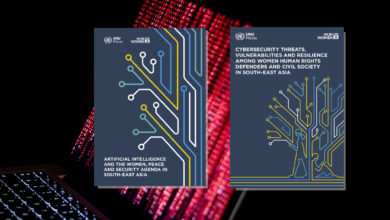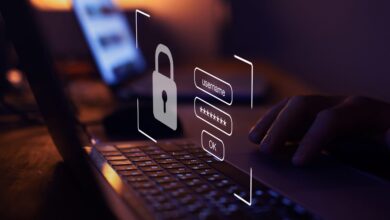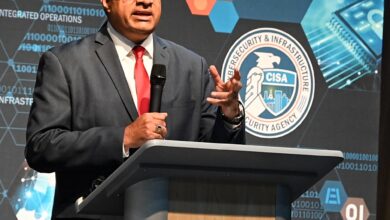Cybersecurity Threats to Global Peace Top the Agenda for South Korea
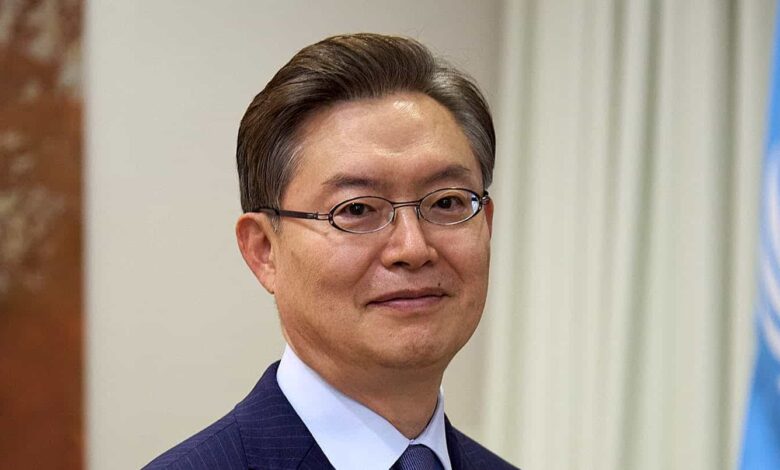
Cybersecurity is an increasingly pressing concern for many countries, and South Korea will dedicate part of its time as rotating monthly president of the United Nations Security Council in June to elevate the misunderstood problem and its effects on global peace and security.
Joonkook Hwang, the permanent representative of South Korea, said in an interview with PassBlue that this agenda will examine the impact of cybersecurity holistically — not focusing on any one country — and how the Council can step up its responsibility of maintaining international peace in the realm of cyberspace. The Republic of Korea, its official name, holds an elected term through Dec. 31, 2025.
“Cybersecurity is widely considered an emerging and present threat to international peace and security,” Hwang said in his office at the Korean mission, a building designed by I.M. Pei and right across the street from the UN. “We are very much keen on elevating the profile of cybersecurity in the Security Council. So throughout our term in the Security Council, we are committed to garnering wide support and building consensus on the enhanced role of the Security Council on this important issue.” The open debate on it will be held on June 20, during which the foreign minister, Cho Tae-yul, will preside.
Cyberattacks are not only used by terrorists and hackers but also by states and state-sponsored operatives to cause economic damage, enable sanctions evasion and fund weapons programs. North Korea, South Korea’s biggest foe in East Asia, conducts ransomware attacks, cyberespionage and cryptocurrency theft, Valerie Kennedy, director of investigations at the software development company Chainalysis, told the Security Council in April.
Eduardo Albrecht, a senior fellow at United Nations University (UNU), in New York City, said that it’s timely for South Korea to highlight the problem as the world witnesses more use of cybersecurity as a geopolitical tool.
A BBC investigation in 2023 showed how the Lazarus group, a team of North Korean hackers, attacked Bangladesh’s national bank and attempted to wipe out $1 billion from its United States account with the Federal Reserve Bank in New York City. Although only $81 million left the Fed, the BBC report showed the sophistication of the group. Pyongyang denied the attack, saying the US was making these allegations to try to tarnish North Korea’s image.
You might be interested in these posts.
[display-posts taxonomy=”category” tax_term=”current” orderby=”date” posts_per_page=”3″ wrapper=”ul” content_class=”pb-inpost-list” wrapper_class=”pb-inpost-layout” exclude_current=”true”]
Cybertools are being used to varying degrees in current conflicts around the world. Since Russia’s full-scale invasion of Ukraine in February 2022, numerous cases of cyberattacks on Ukraine have been reported. A Ukrainian cybersecurity chief told Reuters that Russia attacked Ukraine’s largest telecommunication provider to gather information and cause fear. Albrecht said cyberwarfare is used by all parties in conflicts to spread propaganda.
“It’s multifaceted and not very well understood,” Albrecht of UNU said. “It is used for propaganda in order to manipulate the masses in the enemy’s territory for or against certain political institutions. The way that is occurring today is at an unprecedented scale because so much of our existence is datafied. Globally, all nations large and small, to some extent, play this game. Unfortunately, because they have to.”
Another subject South Korea will highlight in June is the nonproliferation of weapons — a natural link to cybersecurity, Albrecht said. That open debate is scheduled for June 24. North Korea continues to launch ballistic missiles despite several Security Council resolutions forbidding it to do so. On May 27, the country attempted a new launching without issuing airspace or maritime safety notifications to the International Civil Aviation Organization or the International Telecommunication Union.

Khaled Khiari, assistant secretary-general of the UN Department of Political and Peacebuilding Affairs, said on May 31 that DPRK’s unannounced launchings pose serious risks to international civil aviation and maritime traffic.
Kennedy, who addressed the Council in April during an informal meeting sponsored by South Korea, Japan and the United States, said that North Korea uses cyberattacks to expand its weapon of mass destruction and missile programs. North Korea’s hacks have been increasing, she added, and the country has stolen over $4 billion between 2016 and 2023.
“There is no separating what happens in cyberspace from what happens in the real world,” US Ambassador to the UN Linda Thomas-Greenfield said at the meeting. “The two are inextricably linked and cyberspace security is international security.”
Recently, North Korea has been using less techie ways to provoke South Korea: dropping balloons filled with trash across the border. The “gifts of sincerity,” as the north calls them, pushed the south to suspend its 2018 military agreement with its neighbor. Hwang said at a briefing on June 3 that the north’s intensifying hostilities this year may be that it recognizes “the widening gap in national power between North and South Korea” and that “makes them more nervous” about their relationship.
South Korea is also planning to hold a Council meeting midmonth on human rights in North Korea, which is bound to provoke the north.
Each month, PassBlue profiles UN diplomats as their countries assume the Council presidency. To hear more details about the agenda of South Korea as well as the country’s stance on Palestine and UN reform, listen to PassBlue’s latest podcast episode on UN-Scripted, produced by Damilola Banjo and Olivia Ndubuisi, available on SoundCloud and Patreon. The episode also features Albrecht of UNU.
The interview with Hwang has been condensed and edited for clarity.
PassBlue: Let’s start with your signature event for June in the Security Council.
Hwang: Cybersecurity is not on the official agenda of the Council, and we have not held any routine meetings on cybersecurity. This is not for any one country, but it is considered an important issue for all countries. So we are not aiming at specific cyberbehavior, but the open debate is an opportunity to gather the collective wisdom of all UN member states on how the Council as the primary organ responsible for the maintenance of international peace and security will address this important issue.
We are also going to hold an open debate on the secretary-general’s annual report on children and armed conflict. That is mandated. [Former Secretary-General Ban Ki-moon will participate in the session] June will probably be the busiest month of the year for the Council. We have nearly 30 mandated meetings right now, including public ones and informal consultations. Of course, there will be some additional meetings upon request, especially on the grave situations in Gaza and the Ukraine. The Middle East accounts for a significant portion of the meetings, such as Yemen, Syria and Israeli settlements, as well as Somalia, the Congo and so on. We are slated to hold a meeting on Afghanistan, and are going to tackle some nonproliferation issues, especially in relation to Syria and Iran.
PassBlue: Let’s talk about the Mideast. How does your country view Palestine’s right to statehood? How will South Korea use its elected seat in the Council to further this possibility for Palestinians?
Hwang: The Republic of Korea has maintained good relations with both Israel and Palestine for many years, and we voted in favor of the General Assembly resolution [calling for Palestine’s full UN membership] recently, even though we bilaterally have not recognized Palestine as a state. We voted in favor because we have to take more concrete steps to lay the groundwork for a brighter future, based on a two-state solution. Fortunately, all Council members and almost all UN member states support the common goals: ceasefire, the release of hostages, expansion of humanitarian aid and the two-state solution as a long-term vision for Israel and Palestine. But as you know, we haven’t seen much improvement on the ground. We strongly support the ongoing negotiations between Israel and Hamas involved with the US, Egypt and Qatar.
PassBlue: Why is South Korea still not taking the step of formally recognizing Palestine as a state?
Hwang: We are going to take that important step at an appropriate time: the most conducive to the overall development or peace process in the region.
PassBlue: What are the prospects for peace engagement and a ceasefire in the Mideast, particularly between Israel and Palestine?
Hwang: The UN member states, including all the Security Council members, agree on the same goals, but we need to double our efforts to achieve those goals. The current situation is not very optimistic. We still see some possibility of a major ground offensive into Rafah. We have just seen the major development of the request for arrest warrants at the International Criminal Court. As president of the Council, we will strive to encourage sincere, active discussions and to bridge the gap among members to find a consensus on this crucial issue.
PassBlue: Russia used its veto to end the Security Council’s expert panel on North Korea. Russia said the UN sanctions regime, which are still in effect, have immense consequences on the North Korean population and have not deterred DPRK from launching ballistic missiles. Do you agree?
Hwang: The DPRK sanctions regime is the most comprehensive among all sanctions regimes in the Council in terms of scope, subject and level. So it may be difficult for the public or for all UN member states to grasp the whole picture. The Council unanimously agreed on those resolutions. We believe that sanctions have been crucial in slowing down the DPRK WMD program and crucial in determining some major North Korean provocations. Some argue that sanctions have not been effective. We all know that the effectiveness of sanctions depends on the extent to which they are enforced. It is interesting or ironic to note that the countries claiming that sanctions have not been effective are suspected of not fully enforcing them or lacking the will to do so. So what is most important is that all UN member states should enforce Council resolutions in accordance with the charter. This is a [UN] Charter obligation.
PassBlue: What are the alternatives to the mandate of the expert panel, now that it has been disbanded?
Hwang: Russia has single-handedly disbanded a panel of experts that have been working hard for 15 years. The panel was instrumental in providing all UN member states with valuable information regarding the sanctions implementation, evasion and violations. We need to retain that essential function as long as DPRK continues to develop its WMD programs illegally. The sanctions remain in place with or without a panel of experts. So we need to devise some mechanism, alternatives, outside the Council. We are considering various options and we are now weighing up the merits and the potential risks of each option.
PassBlue: South Korea is a member of the Council along with Japan and China, so three big East Asian powers at once — the first time in 28 years. What’s the relationship among the three countries like?
Hwang: Asian countries are not like Africa or the European Union. We don’t have any regional coordinating mechanism like the African Union or EU. We are all individuals, unfortunately. These three countries collectively account for about 20 to 30 percent of global GDP . . . and in light of uncertainties and the tensions in the world and in northeast Asia, including North Korea issues, the need for more dialogue and cooperation among the three countries, especially in the Council, is increasing. However, these three countries do not always present a united stance on significant peace and security issues. We have to make efforts to manage the differences among the three. We always engage with one another bilaterally. Recently, our foreign minister visited China. We are going to have a China, Japan and Korea trilateral summit soon. Our economies are interconnected, and we have the very important peace and security issues we have to tackle together. So we know the importance of cooperation.
PassBlue: There’s been a lot of conversations about Council reform and reform of the UN as a whole. What’s South Korea’s position?
Hwang: The Korean position has been consistent for more than 30 years. We strongly support the increase in the nonpermanent category but oppose the increase in permanent membership because the UN must continuously adapt to evolving international realities. We may support longer tenure for the new category of nonpermanent membership so that we can accommodate the desire of some countries to serve longer on the Council.
PassBlue: Do you have concerns about how the veto is used, particularly in recent years?
Hwang: The veto power is always problematic. We all know that. The veto paralyzes the proper functioning of the Security Council, but at the same time, we note that the UN was structured that way from the start. To make changes to the veto, we need to amend the Charter. The Charter amendment should be endorsed by permanent members themselves. So this is a rather difficult and tricky issue. The permanent members feel pressure from all member states to refrain from exercising their veto power.
PassBlue: When I spoke with Mozambique’s ambassador to the UN for his Council presidency in May, he said the veto should not be used in cases of great humanitarian catastrophe. Do you share the sentiment?
Hwang: We agree with that perspective, and we emphasize that the permanent members should not veto decisions concerning the implementation of Security Council resolutions that they already agreed to. The permanent members vetoed the draft Security Council resolution on the DPRK ICBM test, which was decided by the Council beforehand. If permanent members veto those decisions, that is kind of self-contradictory. So in addition to humanitarian catastrophic situations, I think it’s important that permanent members should be loyal to decisions they have made in the past.
PassBlue: We like our audience to get to know the ambassadors beyond the Security Council and UN activities. What do you do for fun?
Hwang: Our residence is located just three minutes from Central Park and 10 minutes from the busiest commercial center, on Fifth Avenue, so I like spending time over the weekend in Central Park and on Fifth Avenue just walking and watching people.
Ambassador’s Profile
South Korea’s ambassador to the UN: Joonkook Hwang, 63
Languages: Korean and English
Education: Bachelor’s degree in economics from Seoul National University in 1982 and a master’s degree in public affairs from Princeton University in 1986.
His story, briefly: Ambassador Hwang joined South Korea’s Ministry of Foreign Affairs in 1982 and was appointed permanent representative to the UN in July 2022. Previously, he was a counselor (2003-06) and first secretary (1995-97) at the country’s mission to the UN. Born in Seoul in December 1960, Hwang has held other key posts in foreign affairs, including as ambassador to Britain and Northern Ireland (2016-18); special representative (vice foreign minister) for Korean Peninsula Peace and Security Affairs and head of delegation to the Six-Party Talks (2014-16); chief negotiator for the Korean-US Defense Burden-sharing arrangement (2013); deputy chief of mission and minister for political affairs at the Korean embassy in Washington (2010-13); and ambassador and director-general for North Korean nuclear issues (2008-10).
He is married to Shil Rhee and they have two daughters.
Country Profile
Head of State: President Yoon Suk Yeol
Foreign Affairs Minister: Cho Tae-yul
Type of Government: Presidential
Year South Korea Joined the UN: 1991
Years in the Security Council: 2024-2025; 2013-2014; 1996-1997
Population: 51.63 million
Carbon emissions: 10.99 metric tons (tons of CO2 per capita); by comparison, US, 14.7
Damilola Banjo is a reporter for PassBlue. She has a master’s of science degree from the Columbia University Graduate School of Journalism and a B.A. in communications and language arts from the University of Ibadan, Nigeria. She has worked as a producer for NPR’s WAFE station in Charlotte, N.C.; for the BBC as an investigative journalist; and as a staff investigative reporter for Sahara Reporters Media.
